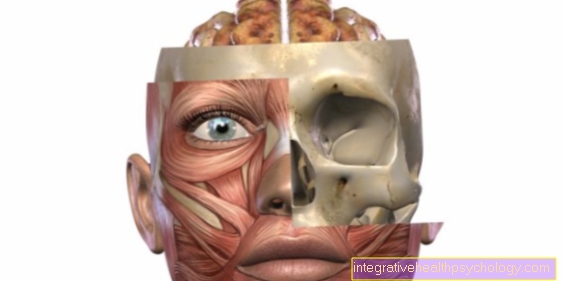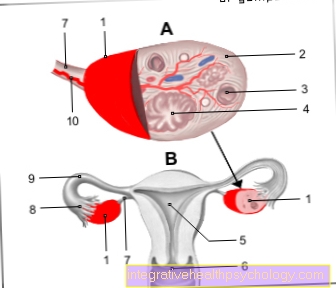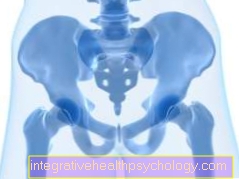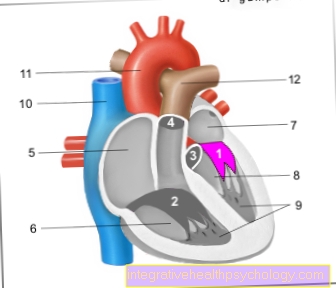Cetirizine
definition
Cetirizine is a medicinal ingredient known as a second generation antihistamine. Medicines containing cetirizine are often used in the therapy of allergies.
Cetirizine is offered in different dosage forms, whereby the drugs are freely available in the pharmacy, so do not require a prescription. The prices vary depending on the pack size and manufacturer, with the generic drugs available sometimes being offered many times cheaper than other available preparations that contain the active ingredient cetirizine.

Mode of action
Pharmacologically can Cetirizine also as H1 receptor antagonist are designated. This means that cetirizine blocks a certain receptor that is normally used by histamine is activated. When histamine binds to the H1 receptor, it has a number of different effects in the body.
Especially with Allergies this receptor plays a crucial role.
Overall, this receptor is widespread in different structures in the body. So the receptor in the smooth muscles, Neurons, as well as in cells of the Immune system be localized. The H1 receptor is found in the smooth muscles of blood vessels and is responsible for activation histamine for an increased Vascular permeability (an increased permeability of fluid) and an expansion of the vessels. This explains the connection that with allergies such as with hay feverwhere there is a lot of histamine in the blood, usually the nose is runny. However, if the H1 receptor is blocked by the cetirizine, the histamine can no longer bind to the receptors and the allergic symptoms ideally disappear almost completely. Also the itching, which often occurs with certain skin diseases or allergies, is histamine-mediated. Blocking the receptors with cetirizine can also significantly improve this symptom.
Another important effect of cetirizine is its effect on Histamine receptors in the smooth muscles of the Bronchi. Without cetirizine, histamine can bind to these receptors, causing the muscles in the bronchi to contract and one shortness of breath can arise. For this reason, allergies in which large amounts of histamine are present in the blood can cause shortness of breath, which can be prevented with cetirizine.
Cetirizine is a second generation antihistamine. In contrast to the first generation of antihistamines, cetirizine is hardly present in the brain after ingestion and thus causes significantly fewer side effects in the form of fatiguewhen this was the case with the first generation. The difference between the two generations of antihistamines is this inability the second generation the so-called Blood-brain barrier to overcome. Since there are also histamine receptors in the brain, which can be blocked by cetirizine, this is of great importance. When the H1 histamine receptors in the brain are blocked, this will "Wake-up system" blocked in the brain and so triggered fatigue. However, since cetirizine does not get through the blood-brain barrier, this tiredness does not occur, or occurs only rarely, when taking cetirizine.
Indications
Cetirizine is mainly used in the treatment of existing ones Allergies or Skin disorders. So can cetirizine at hay fever (allergic rhinitis) can be used to treat typical symptoms such as itching, a runny nose, red eyes, tearing and sneezing.
With a chronic Urticaria Cetirizine can help reduce symptoms such as reddened skin and itching and is approved as an active ingredient for the treatment of these symptoms in existing urticaria.
The dilative effect on the muscles of the bronchi can be used in supportive therapy in a chronic asthma. Since the narrow bronchial tubes and the associated shortness of breath are in the foreground in chronic bronchial asthma, cetirizine can support the treatment of these symptoms.
Metabolism
The so-called Pharmacokinetics describes how a certain active substance is absorbed, distributed and finally broken down and excreted in the body. The active ingredient is mostly orally taken and then first of all enters the Gastrointestinal tractwhere he's about the Mucous membrane is included and in the blood got.
The maximum concentration of cetirizine in the blood is after about 1-2 hours after taking the drug. The maximum concentration can be reached even more quickly if, instead of the tablet form, a liquid dosage form, such as drops or juice. About 60% of the active ingredient are via the kidney excreted unchanged and can thus be found in the urine. About 10 hours after taking the active ingredient, only 50% of the amount is still present in the blood. A so-called "Steady state", in which about the same amount of the active ingredient is constantly present in the blood, is reached after three days with daily intake of 10 mg cetirizine.
Pharmacokinetics play an important role in the use of cetirizine in people who have a impaired kidney function exhibit. This also applies elderly people as kidney function declines over time. Since cetirizine is excreted via the kidneys, the active ingredient remains in the blood longer if the kidneys are not functioning properly. This can and should be done with an adapted, lower dose Getting corrected. In any case, it is important that if you are known to have impaired kidney function, the attending physician informs you about the before taking the active ingredient cetirizine Previous illness is informed.
The pharmacokinetics of the active ingredient in children does not differ significantly from that of adults. However, the dose should be based on the body weight be adjusted. Children usually take a dose of 5 mg a day. It is not recommended for children under two years of age.
Interactions between cetirizine and other drugs or substances are not known. The effects of alcohol are also not increased by taking cetirizine. Simultaneous use of cetirizine and others Food slows down absorption of the active ingredient.
Side effects
Like all Medication Medicines which contain the active ingredient cetirizine are also not without Side effects. Not all side effects have to occur here. The severity of the side effects and the occurrence of these varies from person to person and depends on many factors. It may be that some people feel certain side effects particularly pronounced, while other people do not notice these side effects. If the side effects are particularly pronounced or if symptoms occur that are unexpected and / or unpleasant, the attending physician should be consulted in any case. If necessary, he or she can change the medication and thus prevent the side effects.
With great frequency, symptoms such as fatigue and sleepiness, Dry mouth, nausea, dizziness, a headache as well as a sore throat heard. Although cetirizine belongs to the second generation of antihistamines, which, compared to the first generation, should not normally cause fatigue, this symptom is still common in many people who take the active ingredient.
Occasionally you can also stomach pain, general malaise, itching, diarrhea or even extremely severe fatigue (called asthenia) may occur.
Close rare and extremely rare side effects Visual disturbances, Faint, a fast heartbeat, Weight gain, Seizures, Impairment of the nervous system, and one allergic rash a. In rare cases, certain blood values can also be influenced by taking cetirizine. Taking cetirizine may cause a decrease in the number of platelets in the blood.
The use of heavy machinery, including driving a car, is normally not impaired by taking cetirizine. Should symptoms occur that subjectively restrict driving, the attending physician should be informed in any case.
Since some side effects, some of which occur in connection with cetirizine, can have serious consequences, a doctor should always be consulted to clarify the symptoms.
Contraindications
If a strong Kidney dysfunction a doctor should be asked for advice before taking cetirizine. If necessary, he or she can reduce the dose or prescribe another medication. Even if Difficulty urinating cetirizine should only be taken in consultation with a doctor.
If Allergies persist against the active ingredient or other components of the respective drug, the drug should not be taken.
As the drugs which contain cetirizine mostly Lactose (Lactose) should be taken into account when taking. If appropriate Intolerances Therefore, the drug should only be taken in consultation with a doctor.
The use of cetirizine is not recommended for children under 2 years of age. Older children can take a dose adjusted according to their body weight. However, this should be done in consultation with a doctor.
Taking cetirizine is not recommended for pregnant women. There are not enough data to guarantee absolute harmlessness to the fetus. If ingested by mistake, there is little risk that it will affect the development of the fetus. Nevertheless, continued use should be avoided. Since the drug is in the Breast milk is passed over by a Use during breastfeeding is also not recommended.

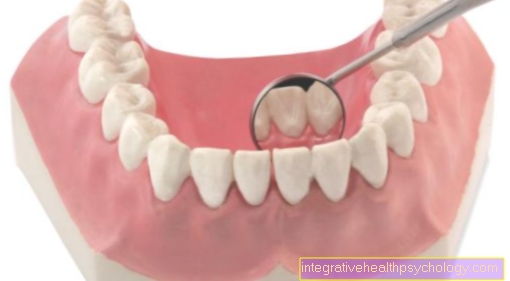

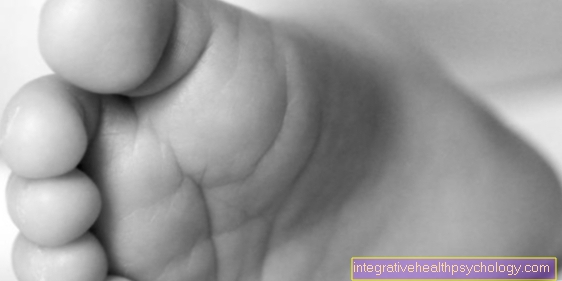
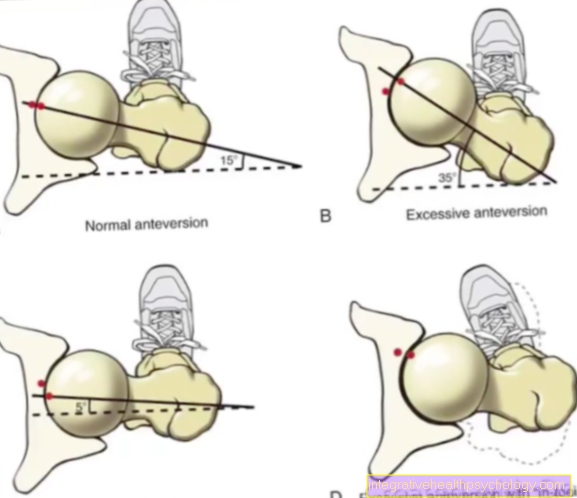
.jpg)




